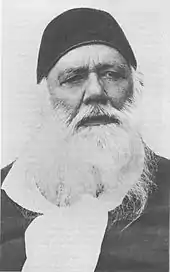Muhammadan Anglo-Oriental College
Muhammadan Anglo-Oriental College was founded in 1875 by Sir Syed Ahmad Khan, initially as a primary school, with the intention of taking it to a college level institution, known as Muhammedan Anglo Oriental Collegiate School. Its given Urdu name was Madrasatul Uloom Musalmanan-e-Hind. It started operations on Queen Victoria's 56th birthday, 24 May 1875.[1]
| Part of a series on |
| Aligarh Movement |
|---|
 |
History
It was established as Madrasatul Uloom Musalmanan-e-Hind in 1875, and after two years it became Muhammadan Anglo-Oriental College. The statesman Sir Syed Ahmad Khan founded the predecessor of Aligarh Muslim University, the Muhammadan Anglo Oriental College, in 1875 having already established two schools. These were part of the movement of Muslim awakening associated with Syed Ahmad Khan which came to be known as Aligarh Movement.[2] He considered competence in English and "Western sciences" necessary skills for maintaining Muslims' political influence, especially in Northern India. Khan's image for the college was based on his visit to Oxford and Cambridge and he wanted to establish an education system similar to the British model.[3]
Sir Syed nursed the institution at a time when English education was a taboo.[4] Intermediate classes were started in 1878, and in 1881 B.A. degree classes were added. In 1881, a civil service preparatory class was started for aspiring students. In 1887, it began to prepare students to enter Thomason College of Civil Engineering at Roorkee.[1]
In the beginning, the college was affiliated with the University of Calcutta[5] for the matriculation examination but became an affiliate of Allahabad University in 1885. In 1877, the school was raised to college level and Robert Bulwer-Lytton, 1st Earl of Lytton
The college also published a magazine by its name.[6]
Sir Syed said that their intention was to establish a university.[7] It was the predecessor of Aligarh Muslim University.
Principals
The former Principals of the college were. [8]
- Henry George Impey Siddons (1877 - 1884)
- Theodore Beck (1884 - 1899)
- Theodore Morison (1899 - 1905)
- William Archbold (1905 - 1909) [9]
- J.H. Towle (1909 - 1919) [10]
- Ziauddin Ahmad (1919 - 1920) [9]
References
- Hardy (1972). The Muslims of British India. CUP Archive. p. 103. ISBN 978-0-521-09783-3.
- "Syed Ahmad Khan and Aligarh Movement". Jagranjosh.com. 12 October 2015. Retrieved 19 November 2017.
- Encyclopedeia of Eminent Thinkers. Concept Publishing Company. 1 January 1998. ISBN 9788180695810.
- Lal, Mohan (1 January 1992). Encyclopaedia of Indian Literature: Sasay to Zorgot. Sahitya Akademi. ISBN 9788126012213.
- "Jurisdiction". www.caluniv.ac.in. Retrieved 5 May 2016.
- "The Muhammadan Anglo-Oriental College magazine". archive.org. Retrieved 19 November 2017.
- Ashraf, Ajaz. "Attorney General has got it all wrong about Aligarh Muslim University minority status: Ex-registrar". Scroll.in. Retrieved 19 November 2017.
- "Architectural History" (PDF). Aligarh Muslim University. Archived from the original (PDF) on 23 May 2016. Retrieved 23 May 2016.
- Hasan (Journalist), Tariq (2006). The Aligarh Movement and the Making of the Indian Muslim Mind, 1857-2002. Rupa & Company.
- Minault, Gail; Lelyveld, David (1974). "The Campaign for a Muslim University, 1898-1920". Modern Asian Studies. 8 (2): 145–189. ISSN 0026-749X.
